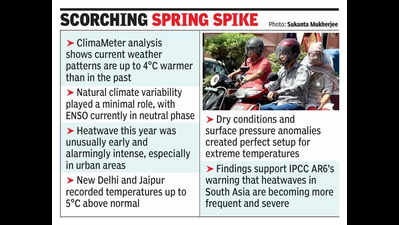- News
- City News
- dehradun News
- April heat wave in N India caused by human-driven climate change: Study
Trending
April heat wave in N India caused by human-driven climate change: Study
Dehradun: The early arrival of the heatwave in April, scorching large parts of India and Pakistan with temperatures exceeding 40°C across North India and reaching 49°C in parts of Pakistan, was largely driven by human-induced climate change, finds a study by climate experts from several countries.
An analysis by ClimaMeter, a France-based climate monitoring organisation, revealed that the heatwave was fuelled by weather patterns that are now up to 4°C warmer than similar events in the past, primarily due to global warming. These meteorological conditions, including temperature, wind, and air pressure, occur with similar frequency as before, but now unfold in a much warmer climate. Natural climate variability played only a minor role, with the current El Niño-Southern Oscillation (ENSO) cycle in a neutral phase.
The study highlights that the 2025 heatwave was not only unusually early but also alarmingly intense. Cities such as New Delhi and Jaipur saw temperatures up to 5°C above normal. In the national capital, daily highs repeatedly crossed 40°C, disrupting daily life and overwhelming electricity and water systems. In Rajasthan and neighbouring states, outdoor workers and farmers bore the brunt, with rising cases of heatstroke and dehydration.
ClimaMeter's findings pointed to surface pressure anomalies and extremely dry, calm conditions as key triggers for the extreme heat. Data from 1987–2023, compared to records from 1950–1986, confirmed a clear warming trend. Urban centres such as New Delhi and Islamabad are now up to 3°C warmer, intensified by the urban heat island effect.
The findings align with the Intergovernmental Panel on Climate Change's Sixth Assessment Report (IPCC AR6), which links the rising frequency, intensity and duration of heatwaves in South Asia to climate change and rapid urbanisation. The report warns that such extreme weather events are becoming "commonplace" and will continue to threaten millions unless urgent mitigation and adaptation efforts are taken.
Experts have urged long-term policy shifts focused on climate resilience, sustainable urban planning, and robust heat-action plans especially in fast-growing Indian cities already under pressure from rising populations and dwindling resources.
End of Article
Follow Us On Social Media









